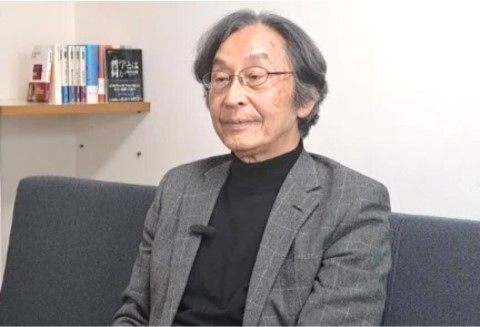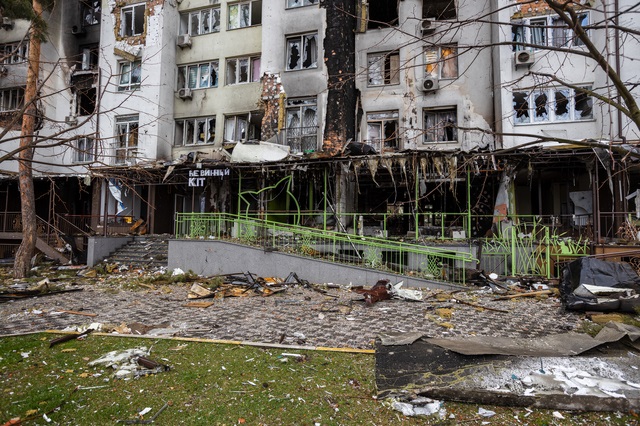Philosophical Essays
……Seeing the world through the telescope of philosophy

①Philosophical principle of war deterrence
〈1 Why do wars occur ?〉
■Question Philosophy seems difficult; what is it really about?
●Takeda The central concept of this site is to reevaluate everything from the telescope of philosophy.
The first point of view in philosophy is to look at the human world over a long span of 100-200 years. The second is the way we ask questions.
Humans pose various questions about this world. From abstract questions like "What is the meaning of human life?" to practical questions like "How can people with different ideas live together peacefully?" There are countless issues, and there are also countless ways to answer them.
Philosophical thinking involves gathering all these possible answers and then taking time to pursue which answers are the most convincing. And this is presented in the simplest possible "keywords." This refined keyword is called "principle" (arche) in philosophy.
Therefore, when viewed through the philosophical telescope, even familiar subjects reveal unique perspectives. The theme of "war" is no exception.
Philosophy tries to look at things from the most fundamental perspective. The key is to gather as many perspectives on an issue as possible and distill them into an essence. This is the "method of principles" in philosophy.
Thus, accumulating these "principles" allows for their application in various scenarios, much like how a skilled jazz musician improvises. It becomes a good art (technique) for deeply thinking about everything, rather than relying on manual thinking. This enables independent thinking, which is also significant.
However, it must be noted that such unique philosophical thinking almost died out in the 20th century for several reasons. The 20th century rather became an era of "anti-philosophy." The reasons for this will be discussed later.

■Question From the "philosophical telescope" you've mentioned, how do societal and personal issues appear? I'm very excited to find out.
To start, my primary question is, "Why do wars occur?" Watching the situation between Ukraine and Russia, I am shocked and anxious that such a war is happening in our time and that it cannot be easily resolved. How has "philosophy" considered the issues of "why wars occur" and "how wars can be prevented"?
●Takeda Before discussing the war in Ukraine, let's simply think about "What is war?"
The first philosophical answer to this question in modern times was given by Thomas Hobbes (1588-1679). His keyword was "the war of all against all." Without special arrangements, humans cannot escape wars among themselves. This is the principle of universal war. It's quite pessimistic, but this idea stands out compared to general thoughts about war. Why is this?
In the past, the representative answer was that war was the will of God, or like a natural disaster, it inevitably occurred and no one could stop it. What about modern times? Some say it's the rulers' desires or the "death instinct" in humans (Freud), but the most representative idea is the struggle over national interests.
However, Hobbes's answer is different. He considers the fundamental cause of war to be "mutual fear"(→"reciprocal fear") (diffidence). This answer also indicates the principle for preventing (→deterring)wars: reciprocal fear must be removed or suppressed.
Therefore, a strong governing authority, or a powerful state, must be established. When strong governance is in place, conflicts are settled by law rather than by force, and random fighting is punished. Hence, universal war ends in that domain.
Hobbes's theory invited various criticisms and opposing views. One common criticism is that Hobbes was a royalist in England, and his theory was just to defend the king's power. From a democratic perspective, like Locke's, it's considered outdated. It's true that Hobbes's theory is not democratic, but this criticism is retrospective( →after-the-fact) and doesn't shake the Hobbs' "principle of war."
For instance, another criticism arises from the idea that wars are struggles over national interests. It seems that if we eliminate nations, wars would end. 20th-century Marxism and postmodern thoughts criticized "the state" itself, seeing it as the root of various dominations, not just wars.
However, according to Hobbes's principle, it's not the state that causes wars but wars that cause the state.
Removing the state doesn't eliminate war; it brings back the state of universal war. Then, a struggle for hegemony begins, a hegemon emerges, and ultimately, an absolute despotic state is formed again.
Is the state the root cause of war, or is war the cause of the state? This is a key question to consider when asking "What is war?" today.
Is Hobbes's "principle of war" truly correct? We'll explore this further next time.
(End of the first installment)
→〈2 Why does war exist only in the human world?〉
〈1 戦争はなぜおきるのか〉
■質問 哲学ってむずかしそうですが、そもそもいったいどういうものなんでしょう?
●竹田 このサイトの中心コンセプトは、どんなことでも哲学の遠望鏡から見直してみよう、です。
哲学のものの見方の第一のポイントは、100年~200年という長いスパンで人間の世界を見ること。第二はその問い方です。
人間はこの世界に対して、さまざまな問いを投げかけます。人間が生きる意味は何かといった抽象的な問いから、いかに考えの異なった人間どうしが仲良く暮らせるかという実際的な問いまで、無数の問題があります。それに対してまた無数の答え方がある。
哲学の思考は、まずこの無数の可能な答え方を全部集め、つぎにそこからどういう答え方がいちばん人々を納得させるかを、時間をかけて追いつめるのです。しかもできるだけ簡潔、シンプルな「キーワード」にして示す。この追いつめられたキーワードを哲学では「原理」(アルケー)と呼びます。
だからどんなことでも哲学の遠望鏡から見ると、ものごとについての、ふつうとはちょっと違った独自の見え方が現われてきます。「戦争」というテーマもそうです。
哲学はものごとを、できるだけ根本的な視点から見ようとする。その要点は、ある問題についてさまざまな「ものの見方」があるけれど、それをできるだけ集めてそのエッセンスを凝縮した言葉(キーワード)を創り出す。それが哲学の「原理の方法」です。
だから「原理」がたまるといろんな場面で応用が効く。優れたジャズの演奏家と同じです。マニュアルの思考ではなく、あらゆることを深く考えるためのよいアート(技術)になる。またそうなると、自分で考えることができるようになります。これも大きい。
ただ一つ言っておくと、哲学のそういう独自の思考法は、じつは二十世紀ではいくつかの理由でほとんど死んでしまっているのです。二十世紀はむしろ「反哲学」の時代になってしまった。なぜそうなったのかについてはもっと後に回します。
■質問 いまお話ししてくれた「哲学の遠望鏡」から、いったい社会や自分自身の問題がどのように見えてくるのか…。これからとても楽しみにしています。
それでまずなにより最初にお聞きしたい質問は「なぜ戦争は起きるんでしょうか」ということです。ウクライナとロシアと情勢を見ていると、今の時代にこうした戦争が起き、それをなかなか収束できないでいることに大きな驚きと不安を感じています。
「哲学」は「戦争はなぜ起きるのか」「どうすれば戦争を防ぐことができるのか」という問題について、どのように考えてきたのでしょうか。
●竹田 ウクライナの戦争の前に、まずシンプルに「戦争とは何か」について考えてみましょう。
近代になって、はじめてこの問いに哲学的な答えを出したのは、トマス・ホッブズ(1588-1679)という人です。彼の出したキーワードは「万人の万人に対する戦争」です。人間は特別の工夫がないかぎり、人間どうしの戦争から抜け出すことができない。これを普遍戦争の原理と言っておきましょう。ずいぶん悲観的ですね。でもこの考えは、戦争についての一般的な考えに比べて、はるかに際立っているのです。なぜそういえるか。
まず昔は、戦争の原因は神の御心、というのが代表的答え、ほかに、戦争は自然災害と同じく必ずやってくるので、誰も止められない。現代ではどうか。支配者の欲望とか、人間にひそむ「死の本能」(フロイト)が原因だ、という説もあるが、まず、国家どうしの利害をめぐる闘争というのがいちばん代表的な考えだと思います。
しかしホッブズの答えは違います。まず戦争の根本原因をホッブズは「相互不安」とします(原語はdiffidence「不信」)。この答えはまた、戦争を抑止するための原理を明示しています。つまり戦争が収まるには、相互不安が取り除かれねばならない。あるいは相互不安を抑制することが戦争抑止の決定条件だということになる。
したがって、答え、強力な統治権力、つまり強力な国家の創設です。強力な統治権力ができると、いろんなコンフリクトは実力の闘いではなく、法で調停される。勝手に闘いあうと罰されるので、その領域では普遍戦争が終わる。なるほどですね。
ホッブズのこの説にはいろんな批判説、反対説があります。まずよくあるのが、ホッブズはそもそも当時のイギリスの王党派だった。だからその説はイギリスの国王の権力を擁護するためのものにすぎない。議会を擁護するロックの考え、つまりいまの民主主義的な考えからはひどく古い、というもの。たしかにホッブズ説が民主主義的な考えでないことはその通りです。だがそれはいまのわれわれの立場からみた事後的な批判であって、「戦争の原理」としてはホッブズの説は動かせないのです。
たとえば、もう一つの批判は、戦争は国家どうしの利害闘争だという考えから出てくる。たしかに、国家どうしが戦争するのだから、国家をすっかりなくしたら戦争も終わるように見えます。二十世紀のマルクス主義もその後のポストモダン思想も、ほぼこの考えに立って、「国家」というものを強く批判しました。国家は、戦争のみならずさまざまな支配の大元だという考えが主流でした。
さてしかし、これにホッブズの戦争の原理をおくとどうなるか。ホッブズの原理が示すものは、国家が戦争の原因なのではなく、むしろ戦争が国家の原因なのです。だから、国家が戦争の原因だという説は原因と結果を完全に取り違えていることになる。
ホッブズ説から言うとこうなります。国家(統治権力)を取り除くと戦争がなくなるどころではない。たちまち普遍戦争状態が立ち戻ってくる。そこからまた覇権闘争がはじまり、覇権者が現われ、その結果もう一度絶対支配的な専制国家ができるのです。
国家が戦争の根本原因なのか、戦争が国家の原因なのか、これが現在、われわれが「戦争とは何か」を問うとき、はっきりと考える必要のあるキークエスチョンです。
はたしてホッブズの「戦争の原理」はほんとうに正しいといえるでしょうか。次回はこれをもう少し考えてみましょう。